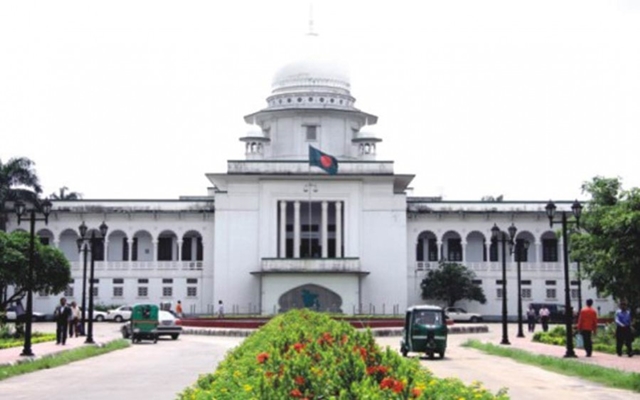SAM
Published:2019-11-04 23:09:23 BdST
HC upholds BB amnesty for loan defaulters
FT ONLINE
The High Court has upheld the Bangladesh Bank's special loan rescheduling policy that extended three more months for loan defaulters to avail the opportunity of regularising loan for 10 years by paying two percent down-payment.
The court issued the order on Sunday after hearing a writ petition that challenged the legality of the Bangladesh Bank's circular of "One Time Exit" policy for defaulters.
It also ordered the Bangladesh Bank to form a nine-member committee to identify banks' weaknesses in approving the loan and its recovering process, as well as make recommendations to solve the issues.
The HC bench of justices JBM Hasan and Md Khairul Alam extended the duration of the circular for 90 days.
The court also directed the central bank to follow the master circular of loan rescheduling of 2012 in disbursing loans to defaulters. It means the defaulters will have to deposit a more 15 percent down payment of their dues to get fresh loans.
Earlier, on May 16, the Bangladesh Bank issued a circular giving special loan rescheduling facility allowing defaulters to regularise their loans for 10 years by paying a two percent down-payment instead of the existing 10 to 15 percent.
Defaulters were asked to apply under the policy within 90 days from the date of the circular.
The High Court on May 21 had put a freeze on the circular responding to an appeal from the Human Rights and Peace for Bangladesh, a human rights organisation.
The top court subsequently halted the stay order for two months, allowing defaulters to avail the facility but barred them from borrowing funds from any other bank during that time.
On October 20, the High Court extended one more month to apply for getting the special rescheduling opportunity.
CPD criticises 'One Time Exit' policy
The Centre for Policy Dialogue (CPD), an independent think-tank, vehemently criticised the exit policy terming it "privileges to promote perverse behavior of borrowers".
The think-tank came up with some strong observations over the policy in its report – "State of the Bangladesh Economy in FY2019-20" – revealed on Sunday.
Analysing the privileges of good borrowers versus bad borrowers, CPD observed that incentives for good borrowers are trivial compared to the incentives provided to bad borrowers.
Borrowers with no record of a bad loan in the last year were offered a 10 percent rebate on interest.
On the other hand, bad borrowers are getting a longer period of time to repay their loans than the time given to the good borrowers. The policy is also allowing bad borrowers to enjoy low-interest rate compared to what the good borrowers are enjoying.
Defaulters are allowed to pay only a two percent down-payment, 10-year loan repayment period, with a one-year grace period under the special policy. Rescheduled loans would have to be repaid at only nine percent interest rate, the lowest range of interest rates.
Those who had initially taken loans at a higher interest rate can now repay at a much lower rate; this may encourage borrowers to default, according to CPD analysis.
The CPD said, "One Time Exit" allows defaulters to pay the bare minimum, which includes bank's cost of funds and principal loan amount, on condition of having to pay the outstanding amount within a year.
"Such a general amnesty to loan defaulters cannot be justified on moral grounds," the analysts said.
Initially, defaulters were asked to apply within 90 days starting from May 16, 2019, but the central bank extended the time period two more times, which allowed even more loan defaulters to avail the facilities.
"These measures are completely contradictory to the broad vision of reducing default loan that was mandated in the election manifesto of 2018 of the ruling party. These are likely to further aggravate the situation of default loan in the banking sector," the analysts said.
The CPD said such special privileges offered to loan defaulters may lead to a moral hazard problem since it could encourage all borrowers to take greater risks.
In essence, it appears that the central bank has offered such privileges on the premise that loan defaulters are mostly honest and are genuinely finding it difficult to repay loans because of high-interest rates, the CPD observed.
To get special facilities for rescheduling loans, about 4,000 applications were submitted to banks till October 20, according to the banks.
The public banks received the most applications for such a facility, whereas the private banks were not showing any interest to offer this facility. Using different pretexts, many banks had been harassing the customers, clients complained to Bangladesh Bank.
To avoid giving such a facility, the private banks were finding faults with the applications of the clients, while many of them were saying that clients were ineligible for such an opportunity.
In such cases, several hundred applications were submitted to Bangladesh Bank. However, the central bank maintained that the banks concerned had the last say in such an issue, adding that the Bangladesh Bank had nothing to do in this regard.
Among the public banks, the defaulters had submitted most applications to Janata Bank, Sonali Bank and BASIC Bank, it was learned. However, default loans in these banks are also high.
Unauthorized use or reproduction of The Finance Today content for commercial purposes is strictly prohibited.


